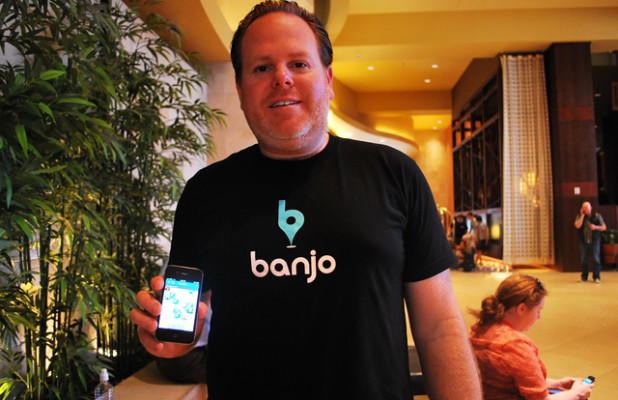A Conversation with Damien Patton, Founder of Location-Based App Banjo [Video]
Location is king. That's the message we're getting here in Austin, Texas, where a slew of social discovery apps leveraging the feature have emerged from the tangle of nascent startups at SXSW Interactive 2012. Chief among them? Banjo, the app that "lets you see everything around you, anytime and anyplace across all major social networks." That description comes straight from the mouth of its CEO and founder, Damien Patton.
In case you haven't fiddled with the app yet, here's what you need to know about it: Banjo integrates with your major social networks, including Twitter, Facebook, Instagram, Foursquare, Google, and more. Because it pulls up data from these networks, it doesn't suffer from the "sparse users" conundrum that most budding apps face. That means you don't even have to convince your friends to hop onto the Banjo train in order for it to be useful — and it doesn't aspire to be another social network soliciting your participation.
LAPTOP Magazine sat down with Patton and asked him to give us a run-through of the app, and to let us in on its fundamental aims — what it really seeks to accomplish, beyond the hype. Read on to see what he told us.
Q: In a nutshell, how would you describe Banjo? A: Banjo gives you an instant community. It integrates across all major services, so you never have to experience another missed opportunity to connect with your network. It's actually not an app but a huge platform with lots of potential. Let me give you an example of how I've used it. Once, I fired up the search component and looked up the interest "Ruby on Rails." I came across all these people who had noted that interest in their public profiles across the web, and I actually ended up hiring two of my current engineers from the list Banjo generated. Q: How did you come up with the idea for Banjo? A: It's a funny story, actually. I was at the airport one day, flying out from Vegas. It was a non-event. But then I went home, opened up Facebook, and suddenly saw that this friend of mine, whom I hadn't seen in 15 years, was at the same airport at the exact same time as me — and we never crossed paths. And this is a good friend of mine — we'd always plan to meet up, but it would never pushthrough. Because I was so frustrated about that missed opportunity, I went home that night and immediately started coding. Q: So what's the essence, the mission of Banjo? A: It's essentially a connection engine — to bring you in contact with things that are important to you, which are nearby. I think that search is literally dying. It's an active deed, plus results can be old or inaccurate. I don't want to have to go out and search for something myself — I want this little gadget, my smartphone, to tell me when there's something I'm interested in that's nearby. Because it knows those things about me already. So in that sense, Banjo is kind of like push search. But even better because it can also look back in time. Q: Some apps make a huge splash at SXSW, but afterward, we leave Austin and they fail to capture the mainstream audience. How will Banjo address that? A: We're pretty secure with our standing on that front. Banjo, by far, has outdone the competition in terms of number of users. In fact, right now, we're the clear leader in the location apps space, with more users than all of the other apps combined. The thing is we've been growing our user base for eight months — and since arriving at SXSW, we've seen a growth of 50,000 new users. I think that makes us confident that our app can survive even after we've left the bubble of the early adopter crowd. We're also in 180 countries, and Banjo users spend a total of 500,000 minutes a day on the app. We have almost a million users making 100 million connections, and there are 3 or 4 million friend alerts pushed to people everyday. Q: What can you say about the charge that Banjo taxes your battery, since the app is location-based? A: Banjo doesn't actually use up as much of your battery as other apps, because it does something called "geofencing," as opposed to using your phone's background location feature. Geofencing refers to your handset's ability to receive alerts or notifications automatically when entering or leaving a specific geographic area — similar to Apple's Reminders app. It wouldn't be accurate to say that Banjo has no battery drain, since there is some measurable drain. But it's minimal, and incomparable to background location apps. Q: What's in store for Banjo? What do you envision for the app in the future? A: Well, like I said earlier, it's the ultimate connection engine. It'll be all about push search. In the future, Banjo will get you the search results you want without you having to search for them. As you travel from place to place, it'll be able to sense things of interest to you — that your friend is nearby, or your favorite band is playing in town soon. Today, your smartphone is already smart enough to know these things. So why should you have to do anything to get that notification? Banjo wants to be the platform that gives you that notification without you having to lift a finger.
- Best of SXSW 2012 So Far
- Interview with Paul Davison, CEO of Highlight
- Hands-on with ISIS Mobile Wallet
Sign up to receive The Snapshot, a free special dispatch from Laptop Mag, in your inbox.

